Ground Pound
- “Yoshi will "Pound The Ground". This has many uses, and it rocks!”
- —Hint Block, Super Mario World 2: Yoshi's Island
The Ground Pound is an ability that has affected the Mario series dramatically, along with moves such as the Wall Jump and Spin Jump. The move is usually executed by crouching in midair, but is sometimes used by pressing the jump button twice instead (this is usually in mini-game applications, such as in the Mario Party games).
The move can break or activate blocks from above, the opposite effect of a normal Jump. It is sometimes the only way to defeat an enemy or complete a task, and is usually more powerful than a regular jump. The Ground Pound is a common move that almost any character can use, even Boo, Dry Bones, and Birdo.
History
Super Mario series
Super Mario Bros. 3
The move was first introduced in Super Mario Bros. 3 by Bowser. This version was different from later versions, as Bowser will look toward the screen when he ground pounds. Later versions have it where the character is facing in the same direction through the whole move. This move was what the Bowser Bomb, a move able to be performed by Bowser in Super Smash Bros. Melee and Super Smash Bros. Brawl, was based on.
Super Mario 64
In Super Mario 64, the Ground Pound move is activated by pressing the Z button (normally used to crouch) while in mid-air. The Ground Pound does serve some functions in this game, such as activating Blue Coin Blocks and defeating enemies. It can also be used to make a quick landing while flying with the Wing Cap.
Mario also uses this move in the Bob-omb Battlefield level in the episode "Behind Chain Chomp's Gate," where he must Ground Pound the small wooden peg holding the Chain Chomp's leash in place in order to free it and claim the Power Star.
It is used once again in Whomp's Fortress, where the player must Ground Pound King Whomp's back once he slams onto the ground in a total of three times in order to defeat him.
Super Mario Sunshine
The use of the Ground Pound is greatly expanded in Super Mario Sunshine. One of its main uses involves using it to flip small circular Manhole covers that appear in both Delfino Plaza and Ricco Harbor. This allows Mario to access secret underground tunnels which often have Blue Coins or 1-Up Mushrooms hidden within them.
The Ground Pound is also used as a means of collecting Shine Sprites. For example, Mario must Ground Pound a small stone wheel located on top of the lighthouse in Delfino Plaza in order to release the Shine Sprite hidden there. However, a normal Ground Pound will not have any effect. He must therefore first use the Rocket Nozzle to blast himself into the air, and then do a Ground Pound. This will result in an extra powerful Ground Pound, which is strong enough to break the stone wheel apart.
This move is also used to defeat certain bosses. For example, in "The Road to the Big Windmill" and "Petey Piranha Strikes Back," the player must Ground Pound Petey Pirahna's engorged belly after spraying water into his mouth three times to defeat him. In addition, it is also used in Episode 3 of Gelato Beach, "Wiggler Ahoy! Full Steam Ahead!," when Mario must battle Wiggler. After spraying the Dune Buds, causing Wiggler to flip onto his back, he must Ground Pound specific segments of his body three consecutive times in order to defeat him. It is also used in the level just before this episode, "Mirror Madness! Tilt, Slam, Bam!," where the player must use it to fling the Plungelos off of the large mirrors near the Shine Tower.
Finally, the Ground Pound plays a major role during the final boss battle with Bowser and Bowser Jr. in Corona Mountain. Mario must again use the Rocket Nozzle to blast himself into the air, and then Ground Pound five separate ends of the large slime-filled hot tub Bowser is sitting in, eventually resulting in the entire hot tub tipping over, and Bowser being defeated.
It can also be used to break apart large square watermelons (often found in secret levels) when they block the way or to pound large nails into the ground.
The Ground Pound can also be used to prevent Mario from taking a considerable amount of damage due to a fall from a great height if used shortly before he hits the ground.
New Super Mario Bros.
The Ground Pound makes several appearances in New Super Mario Bros.. When the player presses down on the D-Pad when in mid-air, the player will perform a Ground Pound. Ground Pounds can be used to break Brick Blocks or repeatedly earn coins from Coin Blocks (by holding the down button on the D-Pad), but Small Mario cannot break them or earn the coins repeatedly (Mario must keep doing Ground Pounds instead of holding down).
Plus, at the World 5 Castle, the player will fight Petey Piranha, who will perform an angled Ground Pound after flying in the air for a few seconds. Once Petey Piranha touches the ground, he will become dizzy and fall down, giving Mario or Luigi a chance to stomp him.
In addition, Ground Pounds deal double damage on enemies and bosses. They can immediately send Koopa Troopas in their shells and start sliding really fast, or to make Snailicorns to slide across the ice. However, the double damage effect was removed on bosses in the sequel (possibly due to the fact it made the game too easy).
If Mario is Mini Mario, then Ground Pounds are required to deal damage, but the damage would only be equal of a regular jump. Ground Pounds must be used as Mini Mario to defeat Mummipokey and Petey Piranha to go to Worlds 4 and 7, respectively (however, using certain cannons can also take Mario there).
Super Mario Galaxy
In Super Mario Galaxy, the Ground Pound is mainly used to activate large switches emblazoned with the Ground Pound logo. These switches appear in just about every galaxy, and can perform any number of functions when pounded, from making Star Bits appear to causing an entire section of the wall to fall down.
In addition to this, beetle-like creatures called Mandibugs make their appearance in this game, and they have the Ground Pound symbol right on the back of their shell. For obvious reasons, Mario must defeat them using a Ground Pound. The boss Bugaboom fought later in the game is also defeated in a similar fashion, though he must be Ground Pounded three times.
The Ground Pound is also used to pound wooden pegs into the ground. An excellent example of this is in the mission "The Dirty Tricks of Major Burrows" in the Gusty Garden Galaxy, where Mario must Ground Pound wooden pegs sticking out of three large apple-shaped planetoids in order to send the large worm inside burrowing through to the next one.
Many stone wheels with the Ground Pound symbol on them also appear in this game, and are usually found stacked on top of one another. Mario must simply Ground Pound over the entire stack to obliterate them all. This is seen in the Toy Time Galaxy in the mission "Heavy-Metal Mecha Bowser," where Mario must Ground Pound the stone wheel antenna on the head of the Mecha Bowser in order to defeat it.
Undergrunt Gunners are also defeated through the use of the Ground Pound, as the glass case covering the cockpit of their large cannons must be Ground Pounded three times in order to break it and defeat them.
There are orange trampolines in certain galaxies with the Ground Pound symbol on them. When the player Ground Pounds them, they will be flung into the air, allowing them to reach certain ? Blocks or platforms that they would not normally be able to reach.
Also, quickly after a spin in midair, Mario or Luigi can do a lock-on Ground Pound, which will cause him to come crashing down directly on a nearby enemy or object without needing to aim first.
New Super Mario Bros. Wii
The Ground Pound from New Super Mario Bros. Wii is the same as the Ground Pound from New Super Mario Bros.. In this game, Ground Pounding a Koopa Troopa, Buzzy Beetle etc. doesn't make it retreat into its shell and start sliding - it defeats it instantly.
In addition to the regular Ground Pound, there is also another variation performable only in multiplayer, called the Simultaneous Ground Pound. This is performed when two or more players Ground Pound at the same time. This creates a circular shockwave that quickly clears all enemies on the screen. The Simultaneous Ground Pound is much more powerful than the regular Ground Pound, and acts similarly to a POW Block.
Super Mario Galaxy 2

The Ground Pound can also be used in Super Mario Galaxy 2, and serves the same purpose as in its predecessor, though with a few minor differences. For example, Meteorites with the Ground Pound symbol on them appear out of the ground in every Bowser level, which the player must Ground Pound in exactly the right place to send them flying into large stone locks blocking the way through the door to the next area.
Meteorites also appear during every Bowser battle, and therefore serve as the player's main means of dealing damage to Bowser in his giant form (however, many of them also release damaging shock waves when they hit the ground, so they are somewhat of a double-edged sword in this regard). The player must Ground Pound several of these meteorites into Bowser during the battle, hitting him a total of four times to defeat him (with the exception of the final battle, in which Bowser will return after being defeated and the player must Ground Pound four more planetoids into him), for a grand total of sixteen times over the course of all three Bowser battles in the game.
Both Glamdozer and her Pupdozer underlings also feature the Ground Pound symbol emblazoned in white (purple in Glamdozer's case) directly on their stomachs, which is positioned as such to clue the player in to their weakness, indicating that they must be Ground Pounded in order to be defeated. However, unlike the majority of other Mario enemies, these particular adversaries must always be Ground Pounded when they are positioned under a flipping cage, as Mario cannot access their weak spot otherwise.
Bugaboom reappears in this game in the Puzzle Plank Galaxy, and is defeated in the same way as in Super Mario Galaxy.
The Whomp King also makes a reappearance in this game in the Throwback Galaxy, and must be defeated in exactly the same way as in Super Mario 64 (by Ground Pounding his back three times when he slams to the ground).
Finally, the Ground Pound also plays a key role in the defeat of Bowser Jr.'s Boomsday Machine in Bowser Jr.'s Boom Bunker, as Mario must Ground Pound the glass case covering the cockpit of the machine (in much the same way as when he dealt with Undergrunt Gunners in the first game).
The lock-on Ground Pound or "Homing Pound" move can also be used in this game, and is activated in the same way: by Spinning and Ground Pounding at the same time.
Yoshi series


The Ground Pound can also be used by Yoshi in the Yoshi games. It was first made famous in Super Mario World 2: Yoshi's Island. This move can be used to stomp on posts, break crates, defeat enemies etc. Indeed, the Ground Pound has been referred to as "Yoshi's proudest move".[1]
The move Yoshi Bomb used by Yoshi in the Super Smash Bros. series was based on the Ground Pound Yoshi performs in the Yoshi series.
Mario Party series
The move has appeared in most Mario platformers, and could be used in many Mario Party mini-games, commonly to flatten opponents and stun them for a few seconds.
Wario series
Wario is another character who has infamously used the Ground Pound. In Wario Land: Super Mario Land 3, he is able to do the move when in Bull Wario form. In Wario Land II and Wario Land 4, he can do this without any ability of any kind. In Wario Land 3, two of the various treasures that Wario collects deal with Ground Pounding―the first introduces the move while the second makes it more powerful.
In Virtual Boy Wario Land, Wario can Body Slam, which very closely resembles ground pounding in two of his forms (Bull Wario and King Dragon Wario). This means a power-up item is required for him to perform this maneuver.
Super Smash Bros. series
Bowser's Ground Pound move was later seen in Super Smash Bros. Melee and Super Smash Bros. Brawl known as the Bowser Bomb. Bowser either faces the screen or has his back to the screen when he uses his Ground Pound, similar to his Ground Pound in Super Mario Bros. 3.
Yoshi also comes with his own Ground Pound known as the Yoshi Bomb in the Super Smash Bros. series.
Paper Mario series
Paper Mario
The Spin Jump move in Paper Mario is extremely similar to a Ground Pound.
Paper Mario: The Thousand-Year Door

In Paper Mario: The Thousand-Year Door, Yoshi Kid can use this attack. To use this attack the player must rapidly tap the R button, this is one of the few attacks that two Stylish Moves can be executed. The closer the player gets to filling the gauge the more times the attack will hit, dealing 1 damage each hit. No FP is needed to use this attack, and the attack is an initial attack. Also, the Spin Jump from Paper Mario returns.
Super Paper Mario
In Super Paper Mario, a Pixl named Thudley grants the hero the Ground Pound ability. This move can be used to stomp on yellow posts, which activates certain things. Ground pounding also deals double damage to enemies.
Names in Other Languages
References
- ^ Yoshi's Story Instruction Booklet, page 11.
Template:RPG Attacks
Template:WW may refer to...
- Template:Wario World, covering Wario World.
- Template:Wario's Woods, covering Wario's Woods.
| This is a disambiguation page — a list of pages associated with a particular title. Please follow one of the links above, or search to find the page you were looking for if it is not listed. If an internal link referred you here, you may want to go back and fix it to point directly to the intended page. |